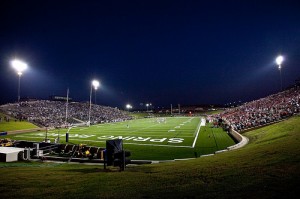
Friday Night Lights by Ed Schipul (CC BY-SA 2.0)
By Jeff Prudhomme
What are different ways to imagine the future of college sports? What could be different ways of organizing college athletics?
Those were the key questions that animated a workshop led by IF Vice President and Fellow Jeff Prudhomme at Drexel University’s College Athletes’ Rights and Empowerment conference. The workshop capped a full day of sessions that explored a variety of perspectives and concerns surrounding the current trajectory of college athletics. After a day spent listening to a variety of presentations, the conference participants were enabled by the IF workshop to take an active role in envisioning alternative directions for college sports through a collaborative discussion. The workshop also provided an opportunity to introduce some of the initial policy ideas emerging from IF’s project on the Future of Sports and Society.
The workshop kicked off with a broad exploration of the big questions and concerns surrounding the future of college sports. Core concerns that emerged had to do with exploring the relation of academics and athletics, the economics of college sports (including the relation of big dollar, or “revenue,” sports and “non-revenue” sports), the ethical treatment and rights of athletes, and the health and safety of athletes.
The participants then discussed alternative ways to address those concerns. Some of the ideas focused on rethinking the values that might shape collegiate athletics—and recognizing that there could be different values to shape different paths forward. For example, if the core value is to reprioritize academics over commercial athletics, there could be an enforceable limit on practice time and game travel (with no sports travel during a class week). If the core value is to use college athletics is as a developmental league for professional sports, then athletes could be allowed to take a lighter academic load (with a longer time to graduate) so they can focus on their sports in season.
The workshop concluded with a brief discussion of some of the policy possibilities emerging from the Future of Sports and Society project (ideas that connect to college athletics):
- Re-integrate athletics and academics
This policy affirms the reciprocity of sports and education: both that college sports should meet educational goals and that those educational goals can be enriched by the reintegration of sports within the educational mission.
- Business is Business
This policy embraces the fact that big money college sports are big business and so they should be run as such. Either teams could be spun-off as licensed concessions of a university, or they could be treated as a university-run enterprise (just as a university hospital). In all cases the athletes would be treated as paid employees because in our society businesses pay their workers.
- Protect the Athlete
This policy focuses on protecting athletes in their health, safety, economic well-being, and civil rights. For example, athletes should have rights to earn a share of revenue their work helps to generate and they should have rights of representation and collective bargaining. This approach would aim to establish a Bill of Rights for college athletes (guaranteed 4 year scholarships, pay for play, healthcare coverage during/after college).
- Sports as a Community Builder
This policy focuses on the power of sports to forge a stronger sense of community. Building on the model of programs like Teach for America, it might support ways to place former or current college athletes in underserved communities to work on community-based sports and fitness programs. This would be a way to return value to communities and to athletes.
- Better Coordination of Sports Organizations with Shared Governance
This policy aims to enhance the efficiency of sports governance by placing individual collegiate sports under the wing of national/international sports organizations or federations and fostering coordination among these organizations. It also aims to keep the organizations focused on the best interests of the athletes by establishing shared governance with athletes.
If you’d like to connect to some of the issues discussed in the Future of Sports and Society project, you might like to join our public Facebook group, Future of Sports.

